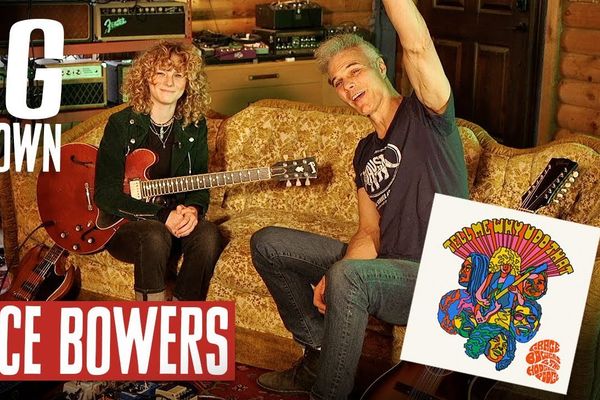Peter Thorn, Lyle Workman, Eric Schermerhorn, Jon Button, Frank Simes, Brian Ray, and Steve Stevens gather in L.A. to discuss the art of being a great sideman
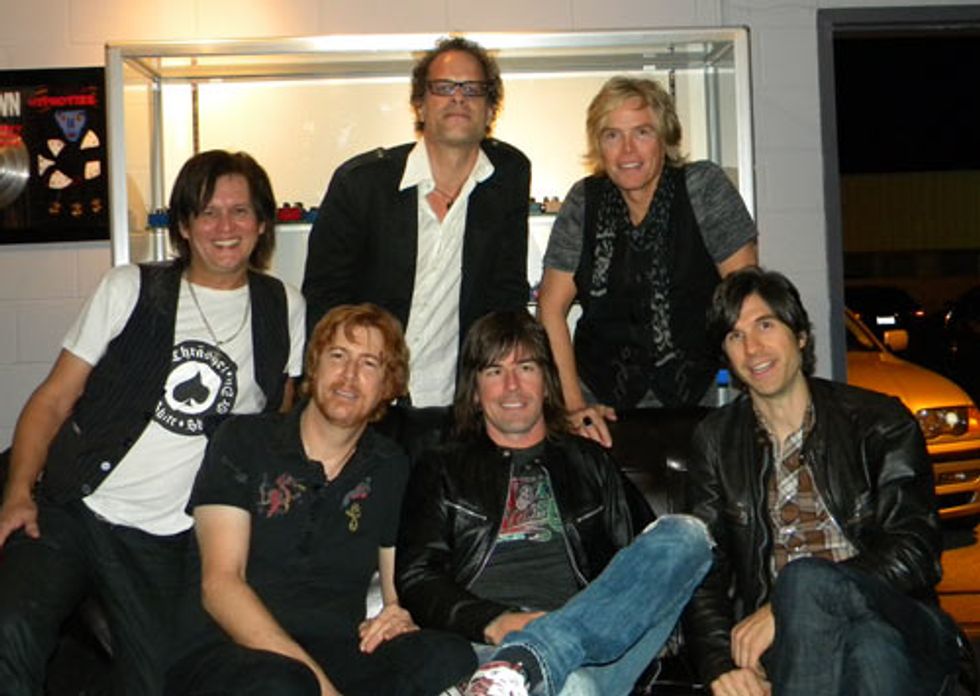
Back: Frank Simes, Eric Schermerhorn, Brian Ray. Front: Lyle Workman, Peter Thorn, Jon Button.
In the second part of our sideman roundtable discussion, The Magnificent Seven discuss communicating with artists, Tom Jones and Elvis, and when they got good. Click here to read part 1...
Do you ever have problems working with artists who are unclear about what they want?
Peter Thorn: Yeah.
Frank Simes: Or they’re not quite sure what they want.
Jon Button: That can be really challenging.
Eric Schermerhorn: A lot times they’ve played it for 10 or 20 years and they’re sick of it and they want to do a whole new thing, and it’s up to you.
Peter Thorn: The more established an artist gets, the more comfortable they are just hiring you and trusting that you’re going to do the right thing. That’s why they get you there. It’s one more thing they don’t have to worry about. He’s got it covered.
Brian Ray: It gives you freedom as a musician to have an assertive front person who knows what they want, knows how to say it, is cool about it, but then allows you to search a little bit within that.
Jon Button: Also sometimes you might work with a younger new artist that never learned the vocabulary of musical lingo to be able to communicate what they want. It’s one thing working with somebody that’s seasoned, that’s kinda been around. They just don’t have the vocabulary to communicate what it is they want.
You probably have to talk to them like you’re not a musician.
Lyle Workman: You don’t say, “Would you like me to modulate the semi-quaver?”
[All Laughing]
That won’t get you anywhere. I didn’t even understand that.
[All Laughing]
Eric Schermerhorn: A lot of times new artists are in love with their record.
Lyle Workman: Or their demos.
Eric Schermerhorn: Well, that’s even worse. But they love their record. It’s their first baby, it’s their first record, and you’re out there and that’s hard. They’ll ask for things that were studio trickery. They want stuff reproduced and they don’t have the experience of having a bunch of guys in a room who could do better. The record is all programmed.
Lyle Workman: You sometimes have to do things that you don’t agree with. I wouldn’t make that choice, but it’s not about that. Go do your own thing if that’s what you really need to do.
Steve Stevens: In Idol we call it The Punk Police. I play initially a hundred notes, then The Punk Police would come in. But there’s something to be said if the end result is something really magic. There are singers that I’ve worked with that sometimes don’t like the attention going away from them. Billy fortunately is not one of those.
Peter Thorn: With you guys, that’s the beauty of your chemistry. That magic combination of however it distills down, it makes a sound that’s so cool.
Steve Stevens: It’s like having a brother or something. You sometimes fight, but at the end of the day you respect him, you love him, and if anybody else says something bad about him, you’ll fucking kill him!
[All Laughing]
Here’s the weird thing. I can remember as a kid seeing The Tom Jones show. He always had that guy. He was the guitar player. Now I know it’s Big Jim Sullivan. I always wanted to be that guy. I didn’t know that was a sideman.
Brian Ray: That’s “Main Man” more than “Sideman” as they call it in England.
Steve Stevens: As a kid I was like, “I wanna be that guy!”
Brian Ray: Jim Sullivan was a major session guy. He did a lot of the old Donovan records.
Steve Stevens: I just knew. I never wanted to be... Because I hated birthday parties… I didn’t want to be Tom Jones. I wanted to be the other guy.
That could be part of a personality test. “Do you want to be in front dancing like Elvis, or be Scotty Moore playing all the cool stuff behind him?”
[All Laughing]
Steve Stevens: My parents when they’d watch TV, my mom dug Elvis, but my dad would be like, “Yeah, but that guitar player is great!”
[All Laughing]
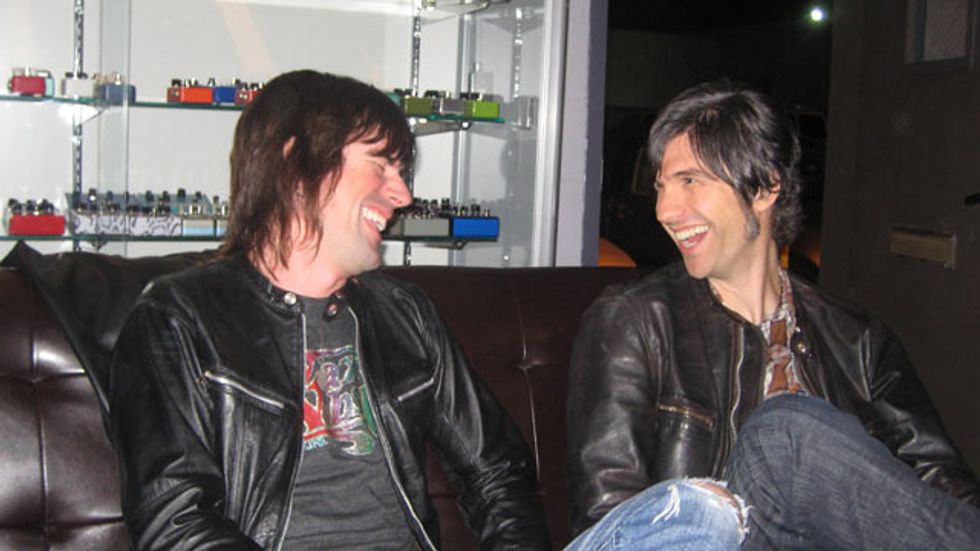
Peter Thorn and Jon Button
At what point in your career did you say to yourself, “I’m really good at this. I can do this.”
Eric Schermerhorn: High school for me. When all your friends are playing sports and you’re just home in your bedroom practicing and listening to records. You’re vibrato is getting better. My band got a record deal in my twenties with Capitol. I was 29 when I played with Bowie and that was my first real, “Oh shit! People pay you to be a sideman!” Until that point I was in bands.
Steve Stevens: I thought I was good until I saw Guthrie Govan play.
[All Laughing]
I was in a band and we got signed to Island Records. Jimmy Miller who produced The Stones brought us down to Compass Point in the Bahamas. The record ended up being shelved. Nothing happened and I thought, "I got a lot to learn about the business part of it." I can do the music. It was so heartbreaking to work toward something. You got a name producer, you’re on a label, and it all fell a part.
Fortunately we got picked up by Bill Aucoin at the end and we left that band because Bill Aucoin brought Billy Idol over. If I hadn’t done that band, Bill Aucoin wouldn’t have had any music to play for Billy Idol to hear what I sounded like. So that helped. It also made me realize it’s not just about having a deal. We didn’t have the songs, basically is what it was.
When I was in New York I was being paid $240 a week. When we came out to LA to do Billy’s first record in ’81, Quincy Jones was down the hall with Michael Jackson. It was like, wow. There’s money being spent on this. We have the right songs, the label believed in us. I could do this. I understand what’s involved and I love doing it.
Brian Ray: The first time I felt like I think I’m going to be ok, was when I did my first gig with Etta James when I was nineteen and we traveled to Europe for the Montreaux festival. The guy who puts on the festival there put an all-star band together for Etta. I was the musical director at nineteen. It was just her husband, Etta, and I. On bass was John Paul Jones...
All: Ohhhh!!!
Brian Ray: ...and all these great jazz players, and Rick Wakeman on keys. We have two rehearsals before the gig and they’re both in the same day, a morning and a night rehearsal. So I’m like, “We got two shots at getting this right.” I got a band of strangers and I’m the MD [Music Director]. No charts. Just me calling out how the horn parts go. At the end of the first rehearsal it’s starting to take some shape with the help of John Paul Jones and everyone else there, and in walks Jimmy Page and Robert Plant.
All: No way!
Brian Ray: We start chatting and they invite me to dinner. On the way down from dinner on the way to the next rehearsal, John Paul Jones is driving me, pulls over and says, “Hey, do you want a little toot?” So I felt like, “Oh my God I’m kinda like a part of this!”
[All Laughing]
It was a great band, a great gig, and those guys all kind of gathered around me and John at the end of the gig with back slapping and beers and wine in Switzerland. I was on cloud nine so that was sort of a really good indication that I was doing the right thing.
Frank Simes: By the time I was thirteen I was playing at junior high school dances and playing Hendrix. This was pre-Zeppelin. It was Hendrix and Cream and Animals, and stuff like that. All the girls were looking up at me and I’m going, “I’m going to keep doing this!”
[All Laughing]
This was back in Japan. I was an American playing on Army bases. I was playing teen clubs and night clubs off base. I was staying up until four in the morning on school nights playing night clubs in Yokohama. Then I got a record deal when I was fourteen playing with these naval dependents. I was the youngest in the band and we were a headlining act at an amphitheater playing to ten thousand people. I was fourteen and I remember having butterflies in my stomach. I thought I was going to lose it, but I kept it together. I think that was the moment. Fourteen years old, record deal, playing to ten thousand people. I said, “I can do this.”
Jon Button: I grew up in Alaska. Growing up there had a very isolated feel to it so I didn’t know how I compared to people in the lower forty-eight. I felt like that was the real world and I was off on this bubble on this other planet. I wanted to go to the University of North Texas, which is a very well known jazz college. I sent a tape of myself playing an audition and I ended up getting a scholarship to go there. That was sort of me realizing that I could compete with people in the real world. That school is known around the world. It’s a pretty well known school for studying jazz. I felt like if they took me seriously I had a chance at doing it.
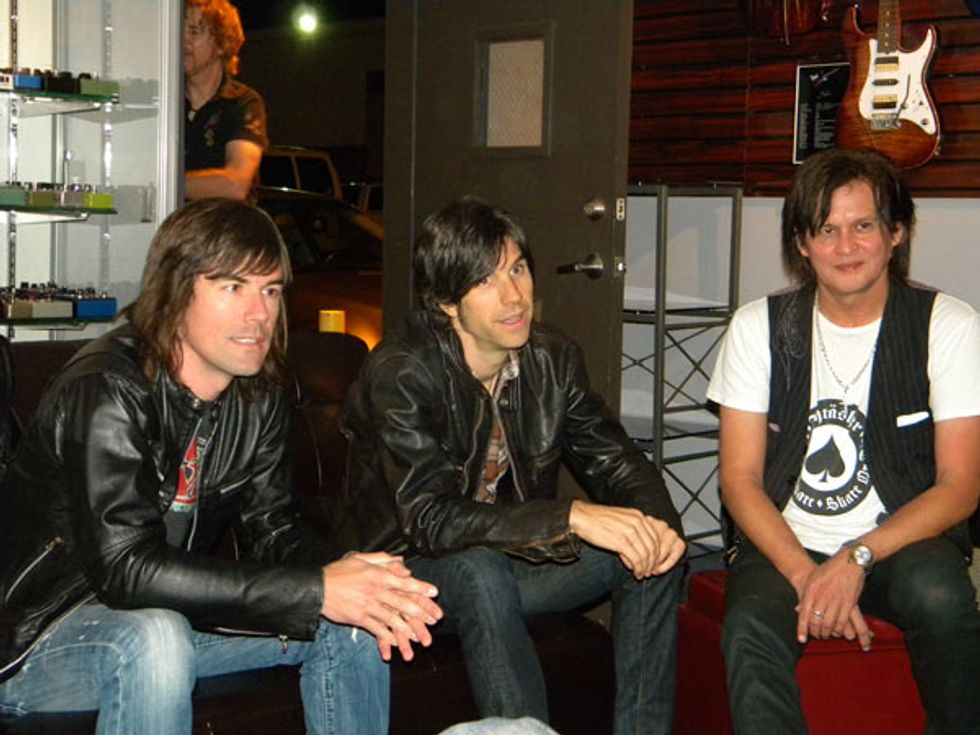
Peter Thorn, Jon Button, and Frank Simes
Peter Thorn: I was bad at sports, a geeky kid with thick glasses, bad haircut, and stuff like that. I wasn’t cool but I found music around fifth grade. I remember in sixth grade health class they had this Les Paul copy and this big old amp that use to shock you if the cord was the wrong way.
[All Laughing]
I took it to sixth grade health class to Show And Tell one day. I plugged in the guitar and played “Iron Man.” No singing. I was just playing the riff. All the kids were sitting there, “Wow!” I remember looking out at all the faces and going, “This is cool. I think I’ve found my deal.” It was really almost that simple. My first marker for me was that experience. That was my first crowd playing in front of people. This was my thing.
Lyle Workman: I grew up in the Northern California area playing in bands. We had a record deal with Island Records. Todd Rundgren produced our second record. Shortly after, we broke up and Todd asked people in Bourgeois Tagg to be his backing band. I think that was the first moment when I thought, now that I’m playing for someone else doing their thing, I guess I’m good enough to be playing with someone who I thought was amazing. That was the first time I thought maybe I can do this outside of being in a band.
Moving down to LA, one thing leads to another. You start doing sessions and then you’re in a room. Vinnie Colaiuta is playing drums and I’m playing guitar...at the same time he’s playing drums!
[All Laughing]
And he’s not on a CD. You’re actually playing with him!
Lyle Workman: Yeah! When you start doing sessions and you start playing with people that’s when you start feeling, ok maybe... I still feel like that when I do a session with one of these guys. I feel like a sixteen year old kid reading the album credits.
There’s a video on YouTube of you directing the sessions for the movie Superbad. The guys on that date are legends.
Lyle Workman: That was fun. I had been asked to do the music for this movie. It was a Judd Apatow production. The director and the filmmakers had already temped in James Brown and Parliament, so it was really clear that we should go with that template. It was my idea and the filmmakers' to call Bootsy Collins, Bernie Worrell, and Clyde Stubblefield. As soon as we started the very first cue, I realized it had to be conducted like a band rehearsal like when I was in high school. We couldn’t put charts up for everyone. We rehearsed it like a garage band and then we recorded it.
Brian Ray: Like a funk jam. That is so cool. It’s a great soundtrack.
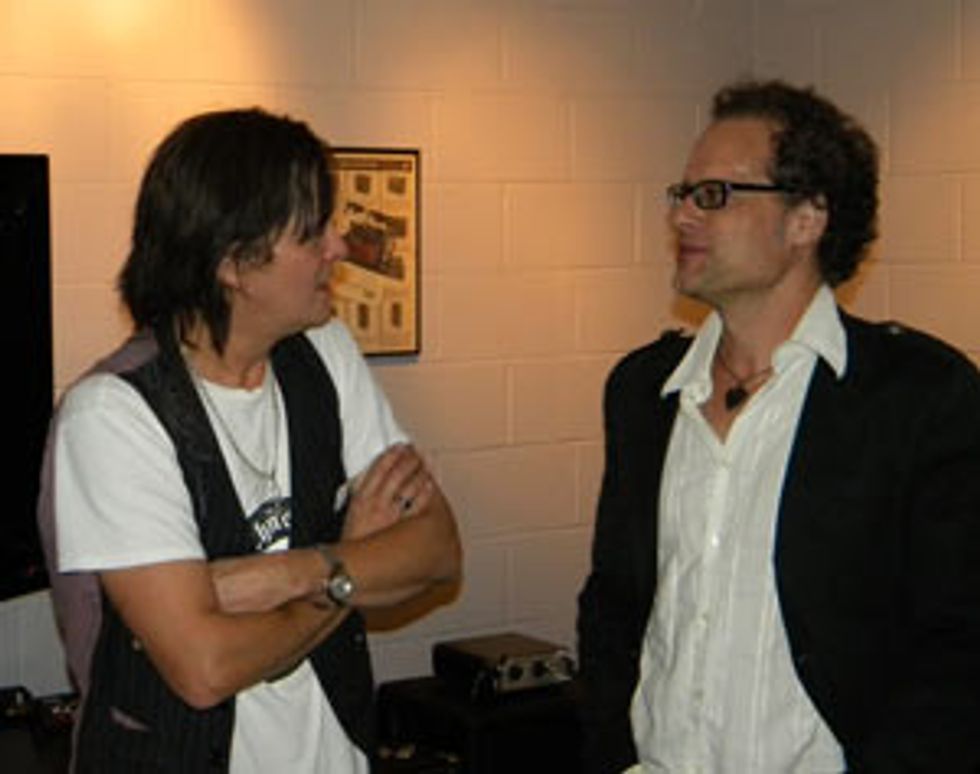
Frank Simes and Eric Schermerhorn
Lyle Workman: I know you’ve had some great experiences on the way up, but playing with Paul has to be the ultimate. Where do you go from there?
[All Laughing]
Steve Stevens: [To Brian] This year we played Download Fest. I was in my hotel and they broadcast your performance from Isle of Wight. It was just astounding.
Brian Ray: Thank you so much.
Steve Stevens: The next day I said to Idol, “You have to see the footage of that.” It’s fuckin’ pyro! “Live and Let Die” was un-fucking unbelievable. The band is incredible.
Brian Ray: He’s so astounding. I don’t think that people expect to get their faces melted by McCartney. They think they’re going to hear some ballads or whatever. Then he rips your face off.
Lyle Workman: He’s so inspiring.
Steve Stevens: Regardless of the legacy, the amount of talent of everyone on that stage that carries their own weight holds up. It’s astounding.
Lyle Workman: [To Brian] You were kind enough to get me into one of your shows. The first time I heard that band I cried. It was powerful, it was perfection, it’s everything [Steve's] saying. I was thinking about everyone that I knew in the band doing it with Paul. I was overcome with emotion. It was the songs and everything. It was the ultimate in what we do, and I saw it in your band.
